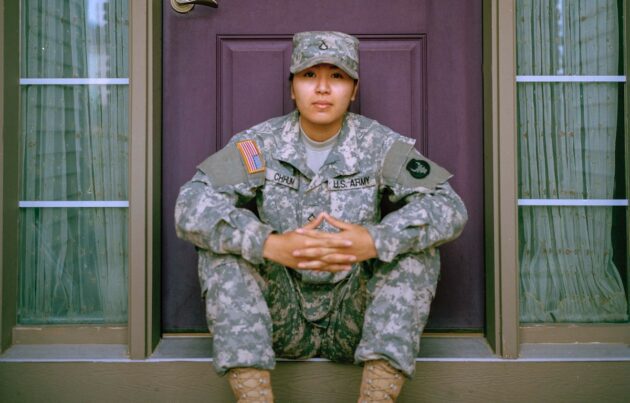Renting to Military Tenants: 6 Things Landlords Need to Know
A lot of uncertainty comes with military service. But, renting to military tenants is easy if you're a flexible landlord. More often than not, it can turn out to be a mutually beneficial relationship.

Many military families live on military bases, but others opt to go home to an off-base rental property at the end of the day. This is no small number, either, as two-thirds of the 1.3 million active-duty members live in off-base housing. Many of these military families simply want a bit of their own space from the base, especially those with children.
Although there are certainly many unknowns when renting to military tenants, the same can be said for civilian renters. Savvy landlords can cater to both audiences with a little bit of know-how, and wind up with good tenants all around.
Things to know about renting to military tenants
They're tough, motivated and willing to sacrifice for their country. For many landlords, renting to service members is a no-brainer. Here are several benefits exclusive to renting to military tenants.

1. Military members have a stable income
Not only do these hard-working men and women have a stable income, but they also get an oh-so-helpful housing allowance every month. Military personnel who qualify for off-base housing receive a monthly Basic Allowance for Housing (BAH) stipend. This amount varies and is based on the individual's pay grade, rank, number of dependents and the cost of living specific to the area.
In addition to having enough salary to cover utilities and other obligations, the BAH stipend is usually more than enough for monthly rent. Ask for an earning statement to verify that the stipend is enough for your property.
2. Sometimes, service members have to move with little notice
Generally speaking, service members know how long they will be in a given area (usually a couple of years). But, that doesn't mean that things won't change occasionally. As a result, military tenants may have to move out with very little notice, leaving landlords in a lurch. That's a pretty big drawback.
The Servicemembers Civil Relief Act (SCRA) protects enlisted military in a number of legal and financial areas, one of those being residential lease terminations required by their service. This applies to members of the U.S. Marine Corps, Army, Air Force, Navy, Coast Guard, reservists (when on active duty), National Guard Members and a few others. This could leave a landlord searching for new tenants earlier than expected.
3. Rental Partnership Program makes it easy to recruit tenants
The Rental Partnership Program (RPP) takes a lot of the pain out of finding, interviewing and confirming renters. This service specifically connects landlords with military prospective tenants looking for off-base housing in their price range. Participating in RPP can help a property owner gain access to a group of potential renters.
RPP does come with some requirements on both sides. Any military tenants who enter an agreement via RPP must sign a legally-binding lease between six months and one year in length (they must have that much time, at least, left on duty in the area).
Landlords must submit to a property inspection, and must also be willing to provide a 5 percent discount on the standard rental rate. Often, the security deposit is also reduced or completely waived. The same concept goes for application and administration fees.
Despite all that, there are some definite perks to renting via RPP, mainly that the rent is usually paid automatically by way of the service member's allotment. No more waiting on checks, Venmos or envelopes full of cash every month!

4. Military families are well connected
Military families are part of one big support system, so they help each other out. Because of this, it's not unusual for a service member to recommend a rental property that they know to be fairly priced, in good condition and well-tended. Never underestimate the power of word-of-mouth referrals, especially when it comes to military renters.
5. Military renters are notably fastidious
Blame it on boot camp! The importance of cleanliness and maintenance are drilled right into the psyches of every service member from an early stage, so they're well versed in what it takes to maintain a property.
6. Evictions are nearly impossible
Sometimes, even with the monthly housing allowance in place, a military tenant can fail to make rent. The SCRA program is designed to protect a military family from being evicted if service is affecting their ability to foot the rent bill.
If the rent is not more than $4,213.28 per month, a court order must be obtained before a military tenant can be evicted. The process can also be delayed for up to three months by the court, thanks to SCRA protections. Evictions are rarely easy for any tenant, but the SCRA protections make it even more challenging.

How to attract military tenants to your rental
The rental business can be pretty competitive, especially in a rural area, so tip the odds in your favor by marketing specifically to people with military status. Here are a few helpful tips to landing great tenants.
Offer a military discount
In the rental listing, publicize a discount good for any current military personnel with valid identification. Many service members would prefer to save some of their basic allowance for a rainy day, if possible. Consider adding other military perks, as well, such as bi-monthly lawn care to say "thank you for your service." Or waive the security deposit as a show of good faith.
Create a flexible lease agreement
Let potential tenants know that you're aware of the many circumstances that can change day-to-day in military life. Edit your standard lease to include an "out clause" in case a sudden transfer requires them to break the lease early. This will make it easier for both you and your tenant.
Or make the lease terms month-to-month from the beginning, with a certain amount of notice required. Chances are, they'll pass along the positive experience to other potential tenants, which can only be good for a property manager.
Get on board with the Rental Partnership Program
Why reinvent the wheel? Working directly with RPP can alleviate a lot of stress because the group already has a well-oiled machine in place to connect military tenants with potential landlords.
Military personnel can make great tenants
Property managers who take a chance on renting to military members are likely to be surprised by how well they stack up against other tenants. After all, paying rent is likely to be the least challenging part of their day.
